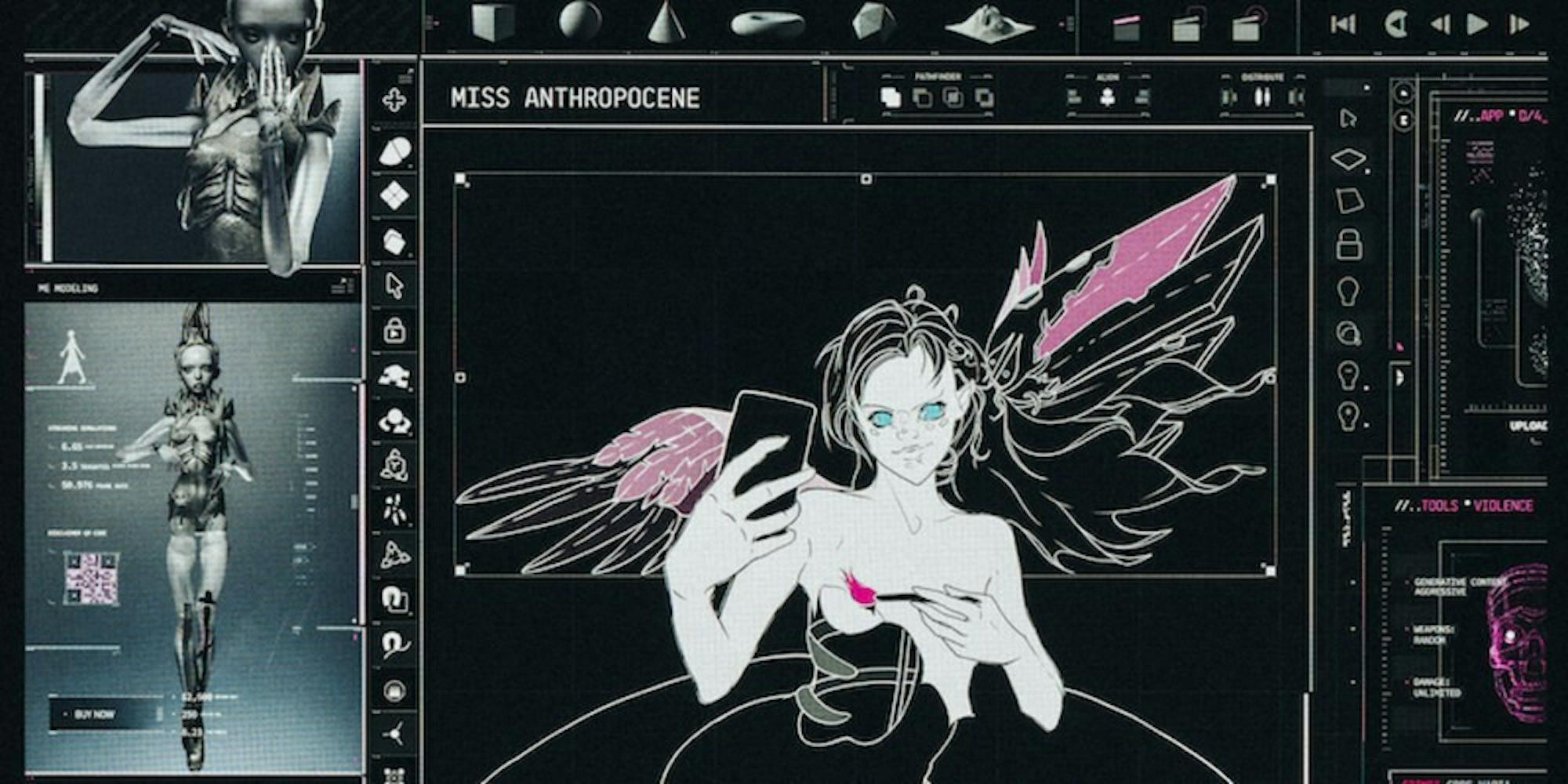The Canadian artist Grimes might be flooding the news recently: her drama with Azealia Banks (the highlight of which involved leaked text messages of Banks telling Grimes she “smell[s] like a roll of nickels”), her relationship with billionaire Elon Musk and confirmed pregnancy with his child and as of last Friday, her new album, “Miss Anthropocene” (2020). According to Grimes’ Instagram, “Miss Anthropocene” is “a concept album about the anthropomorphic Goddess of climate Change: A psychedelic, space-dwelling demon / beauty-Queen who relishes the end of the world. She’s composed of Ivory and Oil.”
It’s certainly a vibrant — and slightly concerning — concept. For Grimes, the dark and fantastical has been done and redone. She’s explored the human psyche and experience through various magical ideas. She’s made music that feels spacious and otherworldly. And even if we can’t admire the final product — although we’d be mistaken not to consider Grimes one of today’s most interesting artists — we can recognize her talent. After all, she made her breakthrough album “Visions” (2012) entirely by herself.
With “Miss Anthropocene,” the final product is certainly very good, but not bulletproof. There's plenty to initially question about Grimes' fifth album, especially considering the narrative surrounding its release and Grimes' personal life. It's her loosest album; there's plenty of breathing room between tracks like "So Heavy I Fell Through the Earth (Art Mix)" — which flows like a light and apocalyptic whisper — and the heavy-hitting "Darkseid" (with 潘PAN). And there's something refreshing about the openness of "Miss Anthropocene." It provides moments for reset, like listening to the futuristic rock of "Before the Fever" after the swanky funk of "You'll Miss Me When I'm Not Around."
But an exciting listening experience is commonplace for a Grimes album. What's the narrative? What story is she telling? That's where "Miss Anthropocene" becomes much more interesting to think about. If we're to accept that it's a concept album focused on climate change, then it becomes much more difficult to figure out what the album is saying about our current climate crisis. Grimes herself has said much about it: she tweeted a pro-climate change poem penned by her creation, Miss Anthropocene, said she wanted to personify climate change so that it's easier to discuss and noted that she wanted "to make a reason to look at it" and "make it beautiful."
But this is all pretext for "Miss Anthropocene." In truth, we shouldn't necessarily trust Grimes the artist when looking at her art. And that's because Grimes is now living a complicated life — her relationship with a billionaire is too deeply rooted in the public consciousness to forget. Before even listening to "Miss Anthropocene," it's easy to critique Grimes for this; is it possible to listen to an album that creates fantastical allusions in an effort to analyze climate change when that album is made by someone who defends Musk online?
It’s complicated. What makes “Miss Anthropocene” a great entry in Grimes’ discography, despite any initial frustrations or criticisms, is that it never commits itself to answering any questions we might ask of it. It just exists. Its songs just play. Bangers like “Violence" (with i_o) are stuffed with rhythmic pumping that’s almost like mind control. “4ÆM” is mysterious and tropical until it explodes into a dance floor bop. It all almost sounds like music an anime character might play during the episode’s big fight.
The album’s lack of focus or expectation means that we can just enjoy each song on its own. There’s nothing really holding the album together. Besides the idea of “Miss Anthropocene” being a concept album, any themes of vulnerability, struggle and human experience seem to stay relatively confined to their tracks. With this, an album that seemed too big and broad to listen to suddenly becomes the perfectly sized Happy Meal. Grimes did not make an album that’s cohesive. Rather, any track can be listened to in any way. This album’s looking to sketch various outlines, not take its time filling in one painting.
And that’s important. If “Miss Anthropocene” had worn some sort of message about climate change on its sleeve — besides the aforementioned paratext it was released with — then it would’ve been much easier to connect Grimes the artist and Grimes the person. But because “Miss Anthropocene” develops its goddess of climate change in various small ways, the listener can’t discover a larger narrative to pin to Grimes’ latest release. Sure, we can critique Grimes for her personal choices and laugh at her public feuds, but there’s no way to connect this to the art she’s creating.
It’s certainly frustrating to conclude that “Miss Anthropocene” is good enough to make us forget for a moment about our criticisms of Grimes or our understanding of Grimes in our current culture. But perhaps that’s the paradox of both Grimes as an artist and the art she creates. She’s here to be appreciated but never fully understood.
Grimes' frustrating art, 'Miss Anthropocene'

The cover of "Miss Anthropocene" (2020) by Grimes is pictured.
Summary
Despite any initial thoughts, "Miss Anthropocene" is a great album with plenty of great songs. It's Grimes at her most confusing and enjoyable.
3.5 Stars





